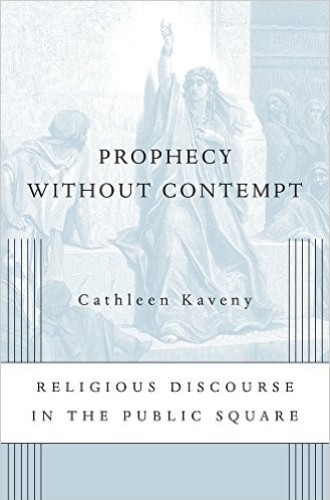A time to shout and a time to whisper
Karl Barth famously proclaimed that ministers should preach with the newspaper in one hand and the Bible in the other. Cathleen Kaveny’s book speaks to an issue snatched from today’s headlines: the easy resort to uncompromising political denunciation by office seekers and social media. As for the Bible, the long arc of her argument suggests an alternative subtitle: From Jeremiah to Jonah.
Kaveny is not a preacher; she teaches law and theology at Boston College. As befits its title, her text is a judicious assessment of the philosophy, history, and practice of what Matthew Arnold called the rhetoric of “fire and strength.” A term of art for such speech is jeremiad, named in honor of the gloomy prophet. Kaveny believes the jeremiad can be a proper tool in public debate, but, using her governing metaphor, it is chemotherapy for the body politic. Prophecy can cure, but, wrongly used, it can destroy the very body it aims to save. Her title captures her message: “prophecy without contempt.”
Read our latest issue or browse back issues.
In this lengthy book, four different perspectives on political discourse are given extensive analysis: the philosophical approach, an historical account of the use of the jeremiad in Puritan New England, an analysis of the political polemic in the 2004 presidential contest, and the author’s recommendations for when prophecy is legitimate in the public square. A coda covering Lincoln’s second inaugural address and the book of Jonah offers an ultimate caution for anyone who would take up the prophetic mantle.
The philosophical section focuses on three recent analyses of religious discussion in public debate: Alasdair MacIntyre’s lament about the erosion of a unitary culture, John Rawls’s view that religious claims, being irrational, disrupt political discussion, and Stephen Carter’s generous notion that all views can be expressed as long as disputants maintain civility. Kaveny critiques each position. Unitary cultures are never, as MacIntyre himself suggests, that unitary. (Her book is dedicated to John Noonan, whose book on Catholicism, A Church That Can and Cannot Change, proves that point.) Rawls had to admit that Martin Luther King’s biblical rhetoric advanced the cause of civil rights. As for Carter’s call for civility, Kaveny cites with guarded approval John Murray Cuddihy’s counter that championing civility easily becomes a mask for privatizing the religious voice. Kaveny faults all the philosophers for confusing political persuasion and professorial dialogue. In the words of the great political thinker Richard J. Daley (quoting Mr. Dooley): “Politics ain’t bean bag.”
The second section of the book will be of particular interest to Century readers. Kaveny locates the roots of the American resort to the jeremiad in Puritan New England. The Puritans organized their society under a New Covenant appropriate for a truly godly people. As with the Israelites of the Old Covenant, weal and woe depended on fidelity to their compact with God. In October of 1727 an earthquake shook New England. An aging Cotton Mather drew the lesson: “Let the Crimes of the City to the Holy GOD for all the Vengeance of an Earthquake upon you, be generally and thoroughly Reformed among you.” Denunciation called the colonists back from sin and slackness.
Kaveny emphasizes the distinction in Old Testament prophecy between “oracles against Israel” and “oracles against the nations.” Puritan denunciations were “against Israel.” They seek reform of the community in order to bring God’s merciful forgiveness. “Oracles of the nations,” however, project no forgiveness. “Let them never rise to possess the earth,” Isaiah proclaimed against the Babylonians (Isa. 14:21).
As various denominations and sects came to populate the colonies, the unifying function of the Puritan Covenant eroded. What compact, divine or secular, would ground national unity or offer an agreed program of reform? In the great 19th-century debate over slavery, abolitionists in the North and defenders of slavery in the South both cited the Bible to advance their cause. Lincoln asserted the unifying power of the Constitution, but the Confederacy appealed to the Constitution’s classification of the slave as three-fifths of a person. The “oracles against Israel,” condemnation under common compact, no longer served—and civil war followed.
Oracular condemnation did not vanish from American public life with the resolution of the war between the states. Kaveny moves into the 21st century with an analysis of prophetic standoffs in the 2004 presidential contest over issues of life and death: abortion and the use of torture in the “War on Terror.”
In the final section Kaveny draws on her legal scholarship to set forth guidelines for prophecy in politics. Prophets trade in moral indictment, so they would do well to follow the restraints put upon public prosecutors seeking a criminal indictment. Time and probity require that only serious cases call for prosecution. Both prophets and prosecutors must resist the temptation to elevate lesser issues into full-press indictments to advance a lesser cause—including enhancing their own advancement. Kaveny then adapts traditional just war theory as a template for legitimating rhetorical war. Jus in bello—discrimination between combatants and noncombatants—means you ought not denounce your opponent’s family. Jus post bellum requires that proper prophecy maintain an opening for rehabilitation.
Kaveny concludes with a strong suggestion that even the true prophet’s voice requires a dash of irony. In his second inaugural address Lincoln pointed to a profound irony: “Both [sides] read the same Bible and pray to the same God . . . the prayers of both could not be answered . . . The Almighty has his own purposes . . . He gives to both North and South this terrible war as the woe to those by whom offense came” (see Matt. 18:7; Luke 17:1).
It is a fearful thing to claim God’s word. Repeatedly the great Old Testament prophets declare their unworthiness, fears, and reluctance to speak. No one does so more than Jonah. Pursuing the fleeing prophet even to the belly of a fish, God goads Jonah into prophesying against Nineveh. When Nineveh repents and is not overturned, Jonah sulks. Why take on the awesome task of preaching doom when God doesn’t follow through with brimstone? The ironic lesson for all prophets: “The Almighty has his own purposes.”
The four sections of Kaveny’s book are so extensive and rich with insight that each could be a book on its own. Yet, despite the breadth and depth of analysis, one is left with a thirst to know even more about the intersection of politics and prophecy. No higher compliment can be extended to a text than that it spurs the reader to further exploration.
Happily, it has spurred Kaveny herself to push on. She concludes that her current effort “require[s] another book” to explore “what happens . . . when practical deliberation goes off the rails . . . tacitly or explicitly betray[ing] the fundamental commitments that serve as its only sound basis.” Good question—and the promise of further enlightenment from the author.






